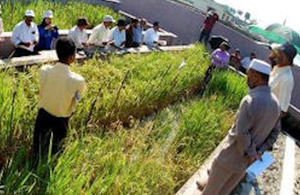DFID Research: Scuba rice - breeding flood-tolerance into Asia's local mega rice varieties
Collaborative research leads to the development of new water-tolerant rice varieties to protect crops from short-term flooding.

Submergence rice varieties at a test site in Bangladesh. Picture: IRRI
New rice varieties tested in India and Bangladesh can survive up to 2 weeks of complete submergence in water, providing farmers with protection against short-term flooding. The flood-resistant gene, when transferred into popular rice varieties, allows them to retain their characteristics. This research has led to the official release of flood-tolerant local rice varieties across Asia.
Through collaborative research led by the International Rice Research Institute (IRRI), a flood-tolerant local rice variety was investigated to isolate the gene responsible for flood resistance. Using a technique known as marker-assisted backcrossing, scientists transferred the water tolerant trait of interest into commercially valuable local rice varieties without losing useful characteristics which make them popular with farmers.
Identification of the genetic code of the SUB1 gene controlling submergence tolerance enabled breeding of new, high-yielding “Sub1 mega-varieties”, with popular characteristics such as high yield, good grain quality and local pest and disease resistance. In collaboration with local partners, the varieties have been disseminated across 10 Asian countries, and are also being tested in Africa. Further seed multiplication and research into flood tolerance is ongoing, as well as identification of genes for drought and salt tolerance.
Read the full version of this case study.
More information
DFID funding on natural resources management and core funding to IRRI over the years to develop the submergence-tolerant varieties was extremely important in developing this research.